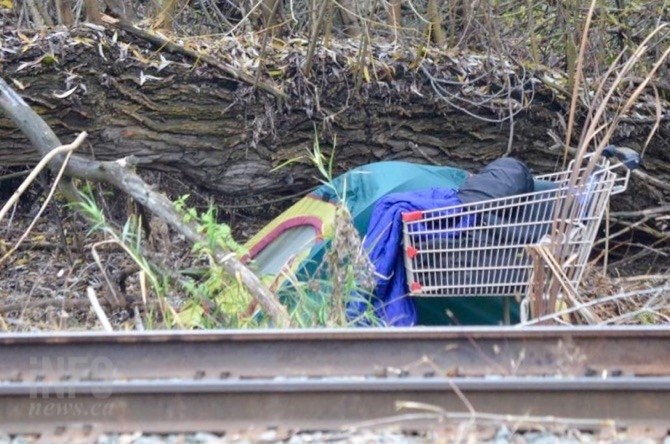
More people are sleeping in tents, without a safe place to call home, in Vernon.
(CHARLOTTE HELSTON / iNFOnews.ca)
April 28, 2016 - 12:46 PM
VERNON - Young adults, couples, seniors and the working poor are among those sleeping outdoors in Vernon, a spring homeless census has found.
The census confirms what local non-profits and Vernon bylaw officers have been seeing for months — a significant increase in the local homeless population. The census, conducted on April 28 by the Camp Okanagan Outreach Liaison Team, found 13 people camping in the city, says Kelly Fehr, with the John Howard Society.
The number of homeless camps in the city was highest in 2008 when 30 were recorded. Thanks to the opening of the Gateway Shelter in 2008, and a concerted effort by local agencies to provide outreach, that number shrank to just two to three a year for a long time — but it’s creeping back up. In October 2015, the census counted six camps. Now, that number has doubled.
“We are seeing some new faces that we have not seen before on the street,” Vernon bylaw manager Clint Kanester, with the action team, says.
The team visited camps around the city and spoke to people between the approximate ages of 19 and 60. Maggie Metz, a coordinator for the John Howard Society’s Homeless Prevention Program, says the 13 people they made contact with — most living with no more than a tent, tarp and sleeping bag — are only a fraction of the homeless population. She says the ‘hidden homeless’ — individuals who are couch surfing, living in unstable housing, or staying in campgrounds — represent a much larger number.
“The biggest comment we got was ‘there is no affordable housing. I don’t have enough money to pay the rent,” Metz says.
The team has seen a marked increase in youth, families, and seniors without a place to call home, and plans to conduct a more in-depth study to determine why these people are on the street.
“We want to talk about why there is homelessness, structurally. Why are people living outside, couch surfing or living at family’s places? What is their income? How many times have they been homeless? Just get a better picture of the causes of homelessness,” Metz says, noting it would be the first time such a review was done in Vernon.
A major driver, Metz says, is the discrepancy between the cost of housing and minimum wage, income assistance and disability rates. When you do the math, she says, it’s easy to see how people are forced onto the street. She also points to the economy and the fact that many formerly employed people are losing jobs, while facing mortgage payments, student loans, and other debt.
“The knee-jerk reaction we see is ‘people should get jobs’ or ‘they’re just lazy,’” Metz says. “The reality is there’s a cycle of poverty in the welfare system. These are citizens that, through life circumstances, have found themselves in a position where the rest of us need to maybe hold them up for a period of time.”
More government funding for homelessness prevention, higher minimum wage and income assistance rates, and a larger inventory of affordable housing would go a long way to getting people off the streets in Vernon, the team says. People can help by lobbying the federal and provincial government for more resources, supporting local non-profits, and offering to be part of the John Howard Society’s network of housing rentals. The team also says a little compassion and understanding can go a long way.
“These citizens want a home, they don’t want to be homeless. They don’t want to be gawked at. There’s a lot of shame attached to not being able to support yourself the way you’d like to,” Fehr says. “It’s unfair for citizens to criticize people living outside and make assumptions of addiction when very frequently it’s issues of minimum wage or disability rates not covering the cost of food that are the cause.”
The rise in the number of homeless people in the city comes at a time when local non-profits like the Upper Room Mission soup kitchen are coping with the loss of provincial gaming grants. Vernon city council plans to strategize with local agencies to lobby senior levels of government for more funding, and have been vocal about the need for a collaborative approach between all levels of government.
To contact a reporter for this story, email Charlotte Helston or call 250-309-5230 or email the editor. You can also submit photos, videos or news tips to the newsroom and be entered to win a monthly prize draw.
We welcome your comments and opinions on our stories but play nice. We won't censor or delete comments unless they contain off-topic statements or links, unnecessary vulgarity, false facts, spam or obviously fake profiles. If you have any concerns about what you see in comments, email the editor in the link above.
News from © iNFOnews, 2016